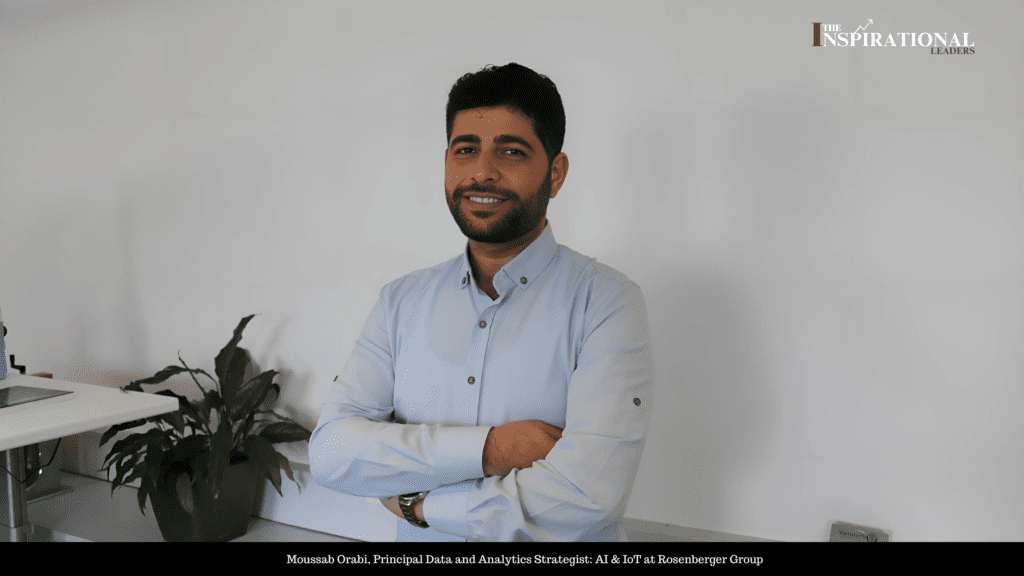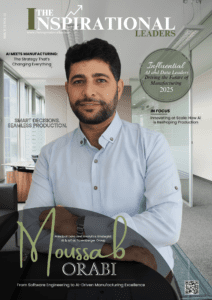Future of Manufacturing: AI and Moussab Orabi's Vision for Data-Driven Innovation
The manufacturing industry is undergoing a seismic transformation, driven by the rapid adoption of Artificial Intelligence (AI) and data-driven technologies. At the forefront of this evolution is Moussab Orabi, Principal Data and Analytics Strategist: AI & IoT at Rosenberger Group. With a deep passion for AI, Orabi has been instrumental in leading Rosenberger’s digital transformation, leveraging AI and IoT to enhance manufacturing efficiency, optimize decision-making, and drive innovation.
A Journey Rooted in AI and Data Science
Orabi’s fascination with patterns in nature, human behavior, and historical events led him to pursue a career in AI and data science. Transitioning from software engineering to making software smarter, he pursued a master’s in Big Data and Decision-Making Systems in 2015. Moving to Germany the same year, he joined Rosenberger as a Software Engineer, gradually shifting to a Data Scientist role. His commitment to AI culminated in a Ph.D. (2021–2024) specializing in process mining for anomaly detection. Since 2024, he has been leading Rosenberger’s AI and IoT strategy, ensuring the company remains at the cutting edge of manufacturing technology.
At Rosenberger, we believe in ‘AI for All’—empowering every department with data-driven insights.
AI and Data Analytics: Transforming Manufacturing
AI and data analytics are set to revolutionize manufacturing, driving predictive maintenance, process optimization, and quality assurance. At Rosenberger, we see AI-powered automation, digital twins, and generative AI enhancing efficiency, minimizing downtime, and enabling real-time decision-making. Machine learning will refine supply chains with better forecasting and risk management, while AI-driven edge computing will improve speed and security. Sustainability will also benefit, with AI optimizing resource use and reducing carbon footprints. Rosenberger remains committed to leveraging these advancements to lead in manufacturing innovation.
Optimizing Manufacturing with AI and Machine Learning
Rosenberger’s Zero Defect Firewall strategy underscores the company’s commitment to quality, integrating AI and ML into process monitoring and quality inspection systems. Real-time anomaly detection using Transformer-based models and end-of-the-line inspection using YOLO-based deep learning ensures early defect identification. Predictive maintenance minimizes equipment failures, reducing downtime and operational costs. Furthermore, AI-driven statistical process control and Six Sigma methodologies streamline production, ensuring consistent quality. Rosenberger’s Generative AI-powered chatbot, Rosi, enhances data-driven decision-making across departments, further driving efficiency.
The past mirrors the future if we make the right projections.
Aligning AI with Rosenberger’s Core Values
Ensuring that AI solutions align with Rosenberger’s core values—quality, efficiency, and sustainability—is paramount. A structured AI strategy integrates ethical AI principles, transparency, and stakeholder collaboration. AI governance frameworks maintain compliance and accountability, while continuous model refinement ensures alignment with business objectives. By embedding AI within its operations, Rosenberger continues to uphold its commitment to high-quality manufacturing.
Data Security and AI-Driven Cybersecurity
Data security and privacy are critical in today’s digital landscape. Rosenberger enforces a multi-layered data governance framework, adhering to GDPR, ISO/IEC 27001, and industry regulations. AI-powered monitoring tools identify and mitigate cybersecurity threats in real time, while federated learning minimizes data exposure risks. Powered by Microsoft Azure, Rosenberger’s modern data platform ensures enhanced security, scalability, and compliance.
Overcoming AI Implementation Challenges
Integrating AI into legacy manufacturing systems poses challenges, including infrastructure limitations, data quality issues, and organizational buy-in. Rosenberger addresses these by modernizing data pipelines in phases, deploying real-time data cleansing mechanisms, and engaging stakeholders through workshops and hands-on demonstrations. By fostering trust and illustrating AI’s impact, the company accelerates AI-driven transformation.
AI is not just a tool; it’s a transformative force that aligns with our core values of quality and sustainability.
Cultivating a Culture of AI-Driven Innovation
Rosenberger embraces an “AI for All” philosophy, ensuring AI adoption is not confined to a single department. Key initiatives include AI workshops and hackathons, research partnerships with academic institutions, and Data & AI Centers of Excellence that foster knowledge-sharing and best practices. Continuous AI training and upskilling ensure that employees remain equipped to drive AI innovation.
Success in AI depends on aligning data, technology, and people.
Impactful AI Projects Driving Manufacturing Excellence
Rosenberger has deployed over 17 AI-driven initiatives that significantly enhance efficiency and quality. Notable projects include:
- Deep Learning for Quality Inspection: YOLO-based defect detection models reduce manual inspection time and improve product quality.
- Anomaly Detection in Electroplating Processes: AI-powered real-time monitoring, leveraging Azure’s Anomaly Detector, minimizes defects.
- AI-Powered Process Mining: Machine learning models identify inefficiencies, streamlining workflows and boosting productivity.
- Collaborative Forecasting System: AI-driven demand planning optimizes supply chain efficiency and responsiveness.
- GenAI for Smart Product Information: Automating product data management improves accuracy and customer experience.
The future of manufacturing lies in digital twins, generative AI, and the industrial metaverse.
Advice for Manufacturers Embarking on AI Transformation
For manufacturers beginning their AI journey, success hinges on three pillars: Data, Technology, and People. AI implementation should align with business needs, ensuring high-quality data governance. Organizations should adopt a phased approach—starting small, proving value, and scaling AI initiatives gradually. Building a data-driven culture through cross-functional collaboration and training ensures widespread AI adoption. Leveraging scalable cloud infrastructure and prioritizing ethical AI practices are also critical.
Emerging AI Trends Shaping the Future of Manufacturing
The future of manufacturing will be defined by AI-driven automation, digital twins, generative AI, and the industrial metaverse. Key technological advancements include:
- Digital Twins & AI Simulation: Enhancing predictive maintenance and operational efficiency.
- Industrial Metaverse & IoT Connectivity: Creating smart, interconnected factory environments.
- Combinatorial AI & AI Agents: Advancing autonomous decision-making and process automation.
To stay ahead, Rosenberger is investing in scalable data infrastructure, expanding AI-driven automation, and developing AI-ready talent through continuous training and innovation initiatives.
With AI, we’re not just making better products; we’re building a better future.
Conclusion
As manufacturing enters an AI-powered era, leaders like Moussab Orabi and Rosenberger Group are at the helm of this transformation. By leveraging AI and data analytics, they are setting new benchmarks in efficiency, quality, and innovation, ensuring that the future of manufacturing is both intelligent and sustainable.




